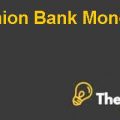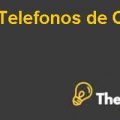
Corporate Governance and Executive Compensation
Question1.)
What was the fair market value of all the executive stock options on their date of grant, according to the Black-Scholes formula?
Answer)
The market value of the executive stock options calculated using black- Scholes option pricing model is almost $2.42 billion. Black Scholes option pricing model is a widely used model for valuing the options and they are specially designed for valuing a European call and put options. Using the put call parity, we can also deduce the value of a put option. The model makes certain assumptions in arriving to the value. The very first of these assumptions is that European style options which can only be exercised at the time of expiration the other type is the American style option which can be exercised anytime, this flexibility of the American option makes it more valuable. Secondly, it assumes no dividends were paid during the life of the option while in reality most companies pay dividend to their shareholders, however the model can be used to consider the dividends by determining the ex dividend date value of the underlying stock. The third assumption that it makes is that the markets are efficient, which means that market movements cannot be predicted and the probability of the stock going up or down is both the same.
Fourthly, it assumes that there is no transaction costs or no fees is incurred in purchasing or selling stocks, hence saying that there are no barriers for trading. Another option that it makes is that the markets are perfectly liquid and they can buy or sell the stock anytime. The most important assumption of black Scholes is the constant volatility, volatility means that how much the stock is expected to move in the near time. Volatility can be relatively constant in the short term, but in the longer term it’s never constant. The interest rate is subject to the same issue, it assumes them to be constant as well. Lastly, it assumes that the returns on the underlying are normally distributed, this assumption is reasonable in the real world.
The variables that this formula takes into consideration are, firstly the current underlying price of the stock, the second one is the option strike price, the third variable is time until expiration of the option, this has a direct positive relationship with the value of a call or put option, as more the time remaining for the option to expire the more would be its value as the price of the underlying stock will move, fourthly what is the volatility of the stock, this means how much the price of the stock would fluctuate, the more it goes higher the value of the option would go higher as well and the last variable that it considers is the risk free interest rates.
| Call Price |
$14.66257 |
| Value of Call Options |
$3,724,292,067 |
| After-tax Option Value |
$2,420,789,844 |
Question2.)
Suppose that Microsoft changed its compensation policy and decided to grant shares of stock to its employees instead of stock options. How many shares would the company have needed to issue to deliver the same amount of economic value as calculated in the answer to question 1 above? Assume the stock price is $24.27 per share.
Answer)
At the stock price of $24.27 the numbers of shares that need to be issued are 153.5 million. However, this change in compensation policy needs to be critically assessed. There are certain advantages of giving shares the very first benefit is of tax savings. If an employee has been given shares they become taxable only become taxable when we sell them for a gain or loss. This is treated under the rules of capital gains tax, which normally has a much lower rate than ordinary income, whereas, in case of options the difference of the option exercise price and the market price would be treated as normal income and hence the tax rates can be quite high. Moreover, in case of shares if they are held for a longer period by the employee the rate for capital gains tax become even lower. But the drawback with giving shares is that we are actually giving the ownership to somebody and even the right to vote. Such significant amount of shares could also lead to employees getting together and forming a formidable decision making authority.
Further, the change in compensation policy would lead to the short term alignment of executive's objectives with the organization’s overall corporate objectives. Since the share option would have a specific vesting period and executives will have to wait up till the vesting period before they can exercise the option in order to purchase the shares at discounted prices. Additionally, the executives would more actively try to put the every possible effort in order to increase the market stock price in the long run up till the exercise date of these options, because their options exercise price is fixed in advance and increase in share price would mean that they will gain on every cent increase in the value of shares.....................
This is just a sample partial case solution. Please place the order on the website to order your own originally done case solution












